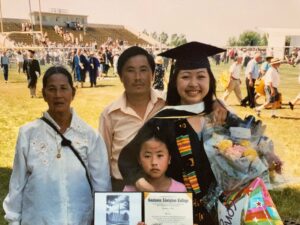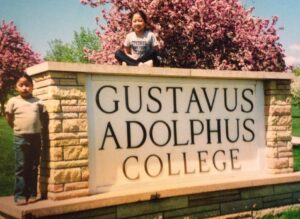It started with Kee. She is the daughter of Hmong immigrants Wang and Yeng Thao, refugees of the Vietnam War and a CIA-sponsored secret operation that destroyed their homelands in Laos. Kee ’06 was born in Laos. Her brother, Yeng ’10, was born in a Thai refugee camp. After sponsorship from an aunt and the Roman Catholic Church, the family of four landed in Rhode Island in December of 1987, “with nothing but the clothes on our backs,” Kee says. “A zip-up jacket—that was my coat at the time.”
A third sibling, Pang ’10, was born in the U.S. less than a year later. Their parents spent a decade working labor jobs in suburban Boston while living and parenting in a new country. “They had to do everything new—learn English, navigate driving—on top of raising three young kids,” says Pang. Not an easy task, especially when Kee and Yeng, who did not yet speak English, struggled at daycare. There were no Hmong resources there at the time, and ultimately the two were removed. More daughters would come, including Amy ’13 and Elizabeth ’19, before the parents packed them all into two vehicles and a U-Haul and moved to southwestern Minnesota.
They settled near family, on a six-acre hobby farm outside of Marshall. “We were so happy on the farm!” says Pang. The family grew close in the country, in a community of their own making, with three more Her kids (for a total of 10, including Emily ’20) and a menagerie of family pets that included a pony named Ponius and a peacock named Kevin.

Gustavus entered their lives through Kee, who saw a flyer about Gustavus at her high school. As a first-generation prospective college student, “I knew I wanted to go to college but I didn’t know what it meant to get there,” she says. The Gustavus admission counselor who visited with her, Yvonne McGee, “we just clicked.” The feeling continued on her campus visit, with the entire family in tow. “My parents were super active participants in the college search process,” says Pang. “We had that dad with the camcorder and an opinion on every campus.”
Kee’s opinion was favorable. “There are colleges that will tell you that you will fit there and colleges that will make you feel that. I had the feeling that I could be a part of Gustavus,” she says.
Choosing Gustavus was the easy part. Leaving home was harder. “I remember my mom dropping me off, and Emily and Elizabeth crying. I was terrified. I had come from a community where we didn’t leave home.” Elizabeth was five, and Emily, four. They cried for the entire two-hour car ride home.
Kee brought war-torn Laos, a refugee camp in Thailand, suburban Boston, rural Minnesota, and a culture of resilience with her to Gustavus. “It was drilled into us as kids that if you don’t know the answer, you step up and ask.” The support was there. “I remember walking into the financial aid office asking, what do I do? And Mark Anderson ’66 [then vice president for admission and financial aid] said, ‘Let’s sit down.’ I had so many friends, advisers, professors who made me feel at home. I knew if I went to somebody, they would help me.”
Yeng followed Kee. “He’s the one who left Gustavus with the most friends,” Pang says. Then it was Pang’s turn. “Gustavus was one less decision for me. Dad would get off my case!” she jokes. Still, she forged her own path. “I had to say, ‘I’m not Kee.’ I got set up with a mentor. We sat down my first year and mapped out all four years and a pivot plan. “That’s not a resource we had at home,” she notes. “I couldn’t sit down with my parents and do that. We were extremely dependent on the resources that were available at Gustavus.”
For three more Her siblings, Gustavus was pretty much their foregone conclusion. “We dragged them everywhere on campus when they were little,” Kee says. “They wanted Gustavus t-shirts for Christmas.” (They got them.) “We encouraged them to look around, but ultimately they had to build their own legacy,” Pang says.
“I set out to be different,” Amy says. “I was like, this is my chance!” She looked at colleges in urban areas, but when she got down to it, “it just became evident that Gustavus was a better fit. I felt comfortable. I had everything I needed.” She did, however, break the mold by studying abroad. “I had to tell our parents, ‘I’m not going for fun.’ I had to give them an entire presentation.”

Elizabeth toured other schools too. “But did I apply? No,” she laughs. “Since I was little, Gustavus was the dream because I was so attached to my older siblings.” The same holds true for Emily. “I remember making a slideshow in the fourth grade about Gustavus and I had to ask how to spell ‘college’. I sent my ACT score to a few different places but I don’t even know why.”
Pang remembers being amazed at the questions one of her younger sisters asked on college tours. Credit transfers, study abroad—they were the questions of someone who had inherited a knowledge of how college works. “I didn’t even know those questions existed when I toured,” Pang says. If you’re among the first in your family to go to college, “you fake it ’til you make it.”
And here they are now. Kee is a physician’s assistant working in critical care. Yeng works for the U.S. Postal Service. Pang manages a process improvement team for Pace Labs. Amy works with her as a quality analyst. Elizabeth is a pediatric nurse on a medical and surgical floor. Emily just finished her first year teaching elementary school art. (The Her siblings also influenced a cousin’s daughter from North Carolina to become a Gustie, Anjolie Kue ’21.) In the Her parents’ living room is a framed photo of six Gusties standing at the sign, though some of the heads have had to be photoshopped in by Elizabeth because the COVID-19 pandemic has prevented them from being together for recent graduations. The last of the Her sibling crew is a sophomore in high school.
Six Gusties at the sign, yet there are seven Gustie Her siblings.
This September, Adriana, born in 2004 during Kee’s sophomore year, joins the Gustavus Class of 2026.